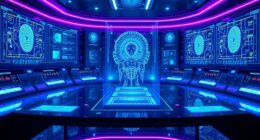As artificial intelligence advances, the worry about job security grows. It is important to identify professions that are protected from the threat of automation.
While AI can streamline tasks and improve efficiency in many fields, there are roles that necessitate the nuanced capabilities of the human mind. These positions demand qualities like creativity, empathy, and critical thinking, which are not easily replicated by machines.
By exploring the list of 10 jobs AI won't replace, one can gain insights into the resilient career paths that offer stability in an increasingly automated world.
Key Takeaways
- Agricultural jobs rely on physical manpower and human skills vital for growth.
- Educators' unique capabilities in shaping character and social skills irreplaceable by AI.
- Personalized learning enhances student engagement and academic achievement effectively.
- Human resources require emotional intelligence and human touch crucial for talent acquisition and cultural fit assessment.
Agricultural Jobs
Amid the evolving landscape of technological advancements, the realm of agricultural jobs stands resilient, offering a promising outlook for individuals seeking hands-on roles that remain impervious to the encroaching influence of AI automation. With a projected 30% increase in agricultural jobs between 2023 and 2027, the sector's reliance on physical manpower remains a cornerstone of its growth. The integration of technologies to combat climate change has further propelled the need for skilled agricultural workers who can adapt to these changes.
As the agricultural industry shifts towards shortening supply chains and embracing sustainable practices, the demand for agricultural workers is on the rise. These roles provide stability and security, as they involve tasks that require a human touch, such as farming practices and decision-making processes. Approximately 3 million additional agricultural roles are expected to be created in the near future, making this sector a beacon of opportunity for those looking to build a career with lasting impact.
Educators

Educators, pivotal in shaping the future through teaching and mentoring, face a landscape where AI is gradually integrated into personalized learning. The blend of human insight and technological advancements in education heralds a new era of tailored instruction and skill development for students.
As AI supports educators in addressing individual learning needs, the synergy between human touch and artificial intelligence is set to redefine the educational experience.
Teaching With AI
The integration of AI in education is revolutionizing the way students learn, enhancing educators' abilities to provide tailored and engaging learning experiences. While AI can assist teachers in facilitating personalized learning journeys, teachers remain irreplaceable due to their unique capabilities.
Teachers' intuitive understanding of students, coupled with their empathy, allows them to cater to individual needs in ways AI cannot. Educators excel in nurturing critical thinking and creativity, areas where AI falls short. Moreover, the human touch they bring to teaching, fostering empathy and social interaction, is fundamental in education.
Educators play a pivotal role in shaping students' character, moral values, and social skills, aspects that go beyond the capabilities of AI, ensuring the security of their career paths.
Personalized Learning
Exploring the realm of personalized learning in education reveals a dynamic landscape where tailored instruction meets individual student needs and preferences with precision and innovation. Educators leverage personalized learning techniques to enhance student engagement, motivation, and academic achievement.
By utilizing adaptive learning technologies, they can provide customized learning experiences that adapt content and pace based on student performance. This fosters a student-centered approach that focuses on individual strengths, weaknesses, and learning styles.
Educators play a crucial role in implementing personalized learning strategies to support students in reaching their full potential, establishing a secure career path that jobs AI won't replace.
Human Resources
Human resources professionals play a critical role in talent acquisition strategies, employee relations guidance, and workplace conflict resolution. These tasks demand a level of emotional intelligence and human touch that AI cannot replicate.
While technology can support HR functions, the essence of effectively managing people lies in the unique abilities of human resources specialists.
Talent Acquisition Strategies
Crafting a successful talent acquisition strategy in the realm of human resources demands a nuanced blend of technology and human insight. When focusing on talent acquisition, human judgment, personal interactions, and human skills play crucial roles in the process. To effectively navigate this landscape, human resources professionals must leverage a combination of AI tools and their innate abilities to connect with candidates on a personal level.
Here are four key elements to consider:
- Utilize AI for resume screening but rely on human judgment for holistic candidate evaluation.
- Prioritize personal interactions to assess cultural fit and soft skills that AI may overlook.
- Emphasize the importance of human skills in tasks like recruiting, onboarding, and staff oversight.
- Recognize that while AI can streamline processes, human intervention remains essential for successful hiring practices.
Employee Relations Guidance
Providing invaluable guidance in navigating complex employee relations scenarios, human resources professionals serve as pivotal facilitators in fostering harmonious workplace interactions and resolving conflicts effectively. Human resources specialists rely on their exceptional interpersonal skills and emotional intelligence to mediate disputes, address grievances, and maintain healthy employer-employee relationships. AI, lacking the nuanced understanding and emotional intelligence required for such intricate tasks, cannot replace the human judgment and empathy essential in employee relations. The role of human resources in guiding employee relations is crucial for promoting positive work environments, ensuring compliance with labor laws, and enhancing employee engagement. These jobs demand a level of human interaction and adaptability that AI currently cannot replicate, making them secure career paths resistant to automation.
| Key Aspects | Human Resources Professionals |
|---|---|
| Interpersonal Skills | Mediating disputes, addressing grievances, fostering healthy relationships among employees |
| Emotional Intelligence | Understanding and managing emotions, empathizing with employees, navigating complex employee relations scenarios |
Workplace Conflict Resolution
Navigating workplace conflicts requires a nuanced understanding of human behavior and emotional intelligence, skills that are essential for maintaining a harmonious work environment and fostering positive relationships within organizations.
In the realm of workplace conflict resolution within human resources, the following points highlight the importance of the human touch:
- Emotional Intelligence: Human resources professionals must possess high emotional intelligence to navigate sensitive situations effectively.
- Interpersonal Dynamics: Understanding the complexities of relationships within the workplace is crucial for mediating conflicts.
- Conflict Resolution Skills: The ability to resolve disputes amicably and constructively is a key aspect of this role.
- Human Touch: AI lacks the empathy and intuition required to handle conflicts with the same level of understanding as a human mediator.
Lawyers and Judges

With their indispensable role in interpreting laws and upholding justice, lawyers and judges showcase a unique blend of skills that AI cannot replicate. The legal profession demands strong emotional intelligence, critical thinking, human empathy, and ethical reasoning, all of which are deeply ingrained in the nature of legal work.
While AI can support tasks like legal research and document drafting, the intricate decision-making processes and nuanced judgment calls required in legal proceedings remain firmly in the realm of human expertise. Lawyers and judges are essential in advocating for clients, navigating complex legal landscapes, and ensuring justice is served with fairness and equity.
The dynamic nature of legal work, which often involves human interactions, moral dilemmas, and strategic planning, makes it a challenging field for AI to fully automate. As such, the creative problem-solving abilities and ethical considerations central to the legal profession ensure that lawyers and judges will continue to play vital roles in society, unaffected by the encroachment of artificial intelligence.
Government Workers and Politicians

In the realm of governance and public service, human cognitive abilities such as creative reasoning and compassion play pivotal roles that artificial intelligence is unable to emulate. Government workers and politicians hold secure career paths due to the unique nature of their roles:
- Job Security: The government work sector is projected to witness a surge in job opportunities in the coming years, ensuring stability in employment for individuals in these positions.
- Human Problem-Solving Skills: Many government jobs entail navigating unforeseen circumstances that demand quick thinking and adaptability, qualities that AI struggles to replicate effectively.
- Emotional Intelligence Requirement: AI falls short in replicating the emotional intelligence crucial for tasks in government and political roles, where understanding and responding to human emotions are paramount.
- Essential Qualities: Roles in government and public service emphasize teamwork, critical thinking, and empathy, which are inherently human qualities that continue to be challenging for AI to mimic convincingly.
Psychiatrists and Psychologists

The realm of mental health care stands as a stronghold against the encroachment of artificial intelligence, with psychiatrists and psychologists harnessing uniquely human qualities to provide essential services that technology cannot replicate. In the midst of a growing mental health crisis, these professionals play a crucial role in offering personalized care that addresses the intricate and individualized needs of each patient. Unlike AI, psychiatrists and psychologists excel in building deep interpersonal relationships, demonstrating high levels of emotional intelligence, and tailoring treatment approaches to suit the unique circumstances of those seeking help.
Their expertise in therapeutic techniques, counseling, and mental health assessments hinges on the ability to navigate complex human emotions and behaviors, interpreting subtle non-verbal cues and nuances in communication. The dynamic nature of mental health treatment requires constant adaptation and creativity, qualities deeply ingrained in the practice of psychiatry and psychology. As technology continues to advance, the irreplaceable value of human connection and empathy in the field of mental health remains steadfast, reinforcing the secure career paths of psychiatrists and psychologists.
Medical Staff (Doctors, Physicians, Nurses, Dentists)

As the field of healthcare advances with intricate medical procedures, the indispensable role of medical staff like doctors, nurses, and dentists becomes evident. Beyond their technical expertise, these professionals excel in establishing vital human connections with patients, a crucial aspect of healthcare that AI cannot replicate.
The blend of advanced medical procedures and the irreplaceable human touch in patient care solidifies the irreplaceability of medical staff roles in the evolving landscape of healthcare.
Advanced Medical Procedures
Demonstrating unparalleled skill and expertise, medical staff including doctors, physicians, nurses, and dentists excel in orchestrating intricate advanced medical procedures that demand critical thinking and precision.
- Specialized Knowledge: Medical professionals possess in-depth knowledge crucial for performing complex surgeries and treatments.
- Critical Decision-making: The ability of medical staff to make quick and accurate decisions in emergencies saves lives.
- Patient-Centered Care: Healthcare providers offer personalized care, empathy, and support tailored to individual patient needs.
- Technological Integration: Continuous advancements in medical technology complement the expertise of medical staff, enhancing patient outcomes and safety.
In the realm of advanced medical procedures, the human touch, adaptability, and expertise of medical professionals remain irreplaceable, ensuring the delivery of high-quality, compassionate healthcare services.
Human Connection in Healthcare
In the realm of healthcare, the profound impact of human connection, fostered by medical professionals such as doctors, physicians, nurses, and dentists, transcends mere treatment to encompass holistic care and emotional support for patients. The irreplaceable essence of empathy, compassion, and bedside manner that these professionals offer plays a vital role in patient recovery and well-being.
Through personalized care, medical staff not only address physical ailments but also attend to the emotional and psychological needs of individuals. Patients seek comfort in the trusting relationships built with their healthcare providers, knowing that beyond expertise and experience, it is the human touch that brings reassurance and understanding.
The human connection in healthcare surpasses the capabilities of AI, highlighting the indispensable role of medical staff in delivering comprehensive care.
Auditors

Exemplifying precision and integrity, auditors play an indispensable role in meticulously examining financial records and ensuring regulatory compliance. To excel in this field, auditors require a unique set of skills and knowledge:
- Analytical Skills: Auditors need to possess strong analytical skills to interpret complex financial information, identify discrepancies, and draw accurate conclusions.
- Accounting Principles: A deep understanding of accounting principles is crucial for auditors to assess the accuracy and reliability of financial statements.
- Attention to Detail: Auditors must have a keen eye for detail to spot errors or inconsistencies within financial records that could impact the organization's compliance.
- Regulatory Knowledge: Staying updated on regulations and compliance standards is essential for auditors to ensure organizations adhere to legal requirements and industry guidelines.
With the demand for auditors expected to grow significantly in the upcoming years, individuals with a passion for numbers, meticulousness, and a commitment to upholding financial integrity can find a rewarding and secure career path in auditing.
Trade Workers (Plumbers, Carpenters, Construction)

Trade workers such as plumbers, carpenters, and construction workers play a fundamental role in shaping and maintaining the physical infrastructure that supports various industries and communities. These individuals possess unique hands-on skills, expertise, and craftsmanship that are essential for the successful completion of construction projects. Unlike many other professions, the work of trade workers requires a level of precision and problem-solving that is challenging to replicate with AI technology. Their ability to interpret blueprints, work with intricate designs, and adapt to on-site challenges showcases the irreplaceable nature of their roles in the workforce.
Plumbers, carpenters, and construction workers are indispensable in the building and maintenance of structures across diverse industries. The demand for these skilled professionals remains high due to the specialized nature of their work and the critical role they play in ensuring the functionality and safety of infrastructure. While AI continues to advance, the craftsmanship and practical skills possessed by trade workers make their positions secure and vital for the foreseeable future.
Artists and Writers

Skilled in their craft and irreplaceable in their roles, artists and writers bring a unique depth of creativity and innovation that sets them apart from the capabilities of AI technology. Here are four reasons why their roles remain secure:
- Human Creativity: Artists and writers possess a level of creativity that is deeply rooted in human emotions and experiences, something that AI struggles to replicate authentically.
- Unique Perspective: The ability to provide a fresh and unique perspective on various topics is a hallmark of artists and writers, setting their work apart from AI-generated art that lacks this personal touch.
- Emotional Depth: The emotional depth portrayed in art and writing reflects the complexities of human feelings, resonating with audiences on a profound level that AI-generated content cannot achieve.
- Human Connection: The personal touch artists and writers infuse into their creations establishes a connection with the audience, fostering a sense of empathy and understanding that goes beyond what AI can offer.
In essence, the creative essence and human connection embedded in the work of artists and writers ensure their continued relevance in a world increasingly driven by technology.
Frequently Asked Questions
What Jobs Will Be Lost Due to Ai?
Jobs that may be lost due to AI include customer service representatives, drivers, computer programmers, and research analysts. Automation in customer service, autonomous vehicles, and generative AI tools threaten these roles. Adapting skills and exploring secure career paths is crucial.
What Jobs Will Be Created by Ai?
The rise of AI heralds the creation of new roles like machine learning engineers and AI ethics specialists. Human expertise remains vital for training, maintaining, and overseeing AI systems, paving the way for innovative career paths.
How Many Jobs Has AI Replaced 2023?
As of 2023, AI has replaced an estimated 23 million jobs globally. This figure reflects the ongoing impact of automation in various industries. The integration of AI continues to reshape the workforce, emphasizing the need for upskilling and adaptation.
Which Jobs AI Will Not Replace?
Certain professions, like those in healthcare, creative fields, roles requiring high emotional intelligence, education, and the legal sector, are unlikely to be replaced by AI due to the intricate, human-centric nature of their work.
Conclusion
In conclusion, as the realm of AI continues to advance, there are secure career paths that are unlikely to be replaced by automation. Jobs requiring human skills, creativity, emotional intelligence, and interpersonal relationships are crucial for long-term career sustainability.
Just as a painter's brushstroke adds depth and emotion to a canvas, these unique qualities in professions like educators, medical staff, and artists will always be in demand in a world driven by technology.









